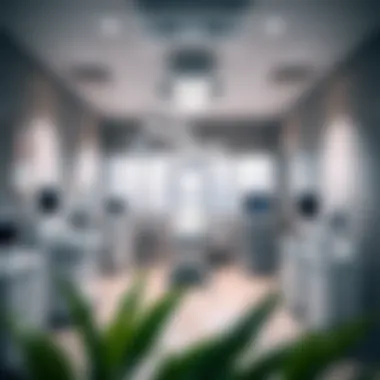Comprehensive Guide to Clinics in International City


Intro
In the bustling landscape of Dubai, International City stands out not just for its vibrant atmosphere but also for the crucial medical facilities that cater to its diverse population. Nestled within this multicultural hub, clinics serve as essential pillars of community health. This article will journey through the medley of services provided by these clinics, inspecting the standards of care and accessibility for both residents and visitors.
In addition, we’ll delve into the cultural dimensions of healthcare in International City, discussing how clinics play a role in enhancing community well-being. By the end, readers will be better equipped to navigate the health resources available in this unique locale, ensuring they make informed choices for their healthcare needs.
Local Culture and Community
International City is more than just a residential area; it's a melting pot of cultures represented by its nearly 200 nationalities. This diversity layers the fabric of community interactions, including how health services are perceived and utilized.
Cultural Festivals and Events
Throughout the year, International City hosts a variety of cultural festivals and events that bring together residents and celebrates the area's rich diversity. These festivities not only foster community spirit but also offer opportunities for health awareness campaigns. During events like the International City Festival and various cultural days, clinics often set up booths offering free check-ups and health tips. It’s a golden chance for the clinics to connect personally with the community and promote preventative health measures in a friendly environment.
Community Engagement and Activities
Community engagement in International City is evident not only through festivals but also through ongoing activities. Regular health workshops and free seminars are organized by clinics to address prevailing health issues and educate residents on important health topics. Many clinics collaborate with local schools and community centers to create health programs tailored to children and families, ensuring that knowledge about wellness is not reserved for adults alone.
An involved community is a healthy community, as the saying goes, and the commitment of clinics to enhance participation through workshops has proven vital in encouraging healthier lifestyles and a stronger sense of belonging among residents.
Lifestyle and Amenities
Alongside its medical facilities, International City offers a variety of lifestyle amenities, contributing to a well-rounded residency experience.
Dining and Culinary Experiences
The culinary scene in International City reflects the vibrant mix of cultures present. From Chinese dim sum to Indian curry and Middle Eastern mezze, there's something to excite every palate. Many restaurants emphasize healthy options, making it easier for health-conscious diners. This diverse dining availability extends the understanding of nutrition, as clinics often partner with local eateries to promote healthy dining through campaigns and nutrition workshops.
Recreational and Entertainment Options
After addressing health, it’s imperative to have avenues for relaxation and leisure. People in International City can indulge in parks, fitness centers, and recreational venues that promote an active lifestyle. Walking paths and expansive parks provide serene spots to unwind, while gyms offer varied programs, encouraging residents to incorporate fitness into their routines. Community fitness events—like fun runs or yoga in the park—often receive support from local clinics, enhancing the interconnectedness of lifestyle and health.
Active engagement in both physical activity and wellness practices contributes significantly to the overall health of residents in International City.
By comprehensively understanding the interplay of health services, cultural dynamics, and lifestyle activities, one can appreciate how International City not only meets healthcare needs but also fosters a holistic environment for its residents.
Prologue to International City
International City represents a unique slice of urban development in Dubai, marked by its diverse blend of cultures and distinct geographical layout. This section provides a crucial backdrop for our exploration of the medical facilities operating within this locale. Understanding International City helps shed light on how healthcare services adapt to the needs of its multifaceted population, which includes a mix of expatriates and local residents. The clinics here are not just places for treatment; they represent a vital community resource, integrating healthcare into the everyday lives of the people.
Geographically speaking, International City stands out with its sprawling residential areas, designed to accommodate a large number of inhabitants. The layout facilitates accessibility to various amenities, including healthcare options. As such, examining the geographical overview lays the foundation for understanding how these clinics operate effectively within a dynamic urban setting.
Additionally, the cultural significance of the area cannot be overstated. With a plethora of backgrounds represented, the healthcare services must also consider varying cultural needs and preferences. For instance, clinics often tailor their communication styles and treatment protocols to accommodate both the local customs of Emirati patients and the diverse expectations of expatriates. This dual focus enhances the significance of healthcare in fostering community cohesion and well-being.
In summary, grasping the essence of International City provides vital context for appreciating the medical landscape in this part of Dubai. The interplay between location, culture, and healthcare underscores the importance of understanding the environment in which these clinics operate.
Geographical Overview
Nestled in the eastern part of Dubai, International City boasts a strategic location that connects various key areas of the emirate. Its proximity to the Dubai International Airport and major road networks makes it an accessible haven for residents and visitors alike. The city is organized into several themed districts, reflecting diverse architectural styles, which not only attract potential new inhabitants but also influence the types of services established, including healthcare facilities.
The layout of International City promotes community interaction and easy commuting, both essential for people seeking regular access to medical clinics. Streets lined with shops and leisure facilities ensure that residents have everything at their doorstep, contributing to a holistic living experience that underscores the importance of convenient healthcare.
The climate here, typical of the region, also bears relevance to healthcare service specifics. Many residents face health considerations related to lifestyle choices, necessitating clinics that offer targeted preventive care and wellness programs.
Cultural Significance
The cultural tapestry of International City richly informs the healthcare landscape in the area. With over 200 nationalities represented, clinics face the unique challenge of providing culturally competent care. The presence of large expatriate communities, including groups from South Asia, Europe, and the Middle East, ensures that healthcare providers must embrace cultural sensitivity and inclusivity in their practices.
Healthcare facilities often employ multi-lingual staff to bridge communication gaps and cater to the diverse linguistic needs of patients. This might include hiring professionals fluent in Hindi, Arabic, Mandarin, and English, among others. Such practices ensure that patients feel more comfortable and understood, which is vital for effective healthcare delivery.
Furthermore, local customs and values shape how healthcare is perceived and accessed. For many families, traditional beliefs about health and medicine can greatly affect their healthcare choices. Clinics often integrate these traditional perspectives into their treatment protocols, leading to more effective patient outcomes.
In summary, recognizing the cultural significance and geographical context of International City unveils the layers of complexity surrounding the healthcare facilities found here. Amid this diverse population, the clinics serve not just as medical institutions, but as pivotal community hubs that reflect the socio-cultural dynamics of the locality.


The Healthcare Landscape in International City
The healthcare landscape in International City is a vital aspect of life here, shaping how residents, expatriates, and visitors approach their health and wellness. This area showcases a diverse array of medical facilities that not only cater to the needs of a varied demographic but also support the overall healthcare framework of Dubai. By examining the types of medical institutions present and their respective standards, one can appreciate the profound impact of accessible healthcare on community well-being.
Types of Medical Facilities Available
Private Clinics
Private clinics in International City have emerged as a popular choice for many, offering tailored healthcare options that prioritise individual patient needs. One key characteristic of these facilities is the shorter waiting times, allowing patients to schedule appointments with ease. Many private clinics are equipped with modern technology and staffed by skilled professionals who often speak multiple languages, catering especially to the international community.
The unique feature of these clinics is the level of personalised care they provide, as they often build strong relationships with their patients. This level of attention can result in a more comfortable experience for patients, leading to better adherence to treatment plans. However, one drawback might be the cost, as services in private clinics tend to be higher compared to public facilities. Yet, many consider that peace of mind and convenience make it worth the price, especially for routine services or specialist consultations.
Public Health Services
In contrast, public health services play a crucial role in ensuring that essential healthcare is available to all residents, regardless of their financial standing. These services, funded by the government, are focused on offering affordable healthcare options to local residents and expatriates alike. A key characteristic of public health services is their emphasis on preventive care and education, aiming to reduce the incidence of diseases through awareness campaigns and vaccinations.
These facilities often have extensive resources dedicated to primary care, making them an advantageous choice for those seeking budget-friendly options. However, the major downside to public health services can be the longer waiting times and potentially overcrowded conditions, especially during peak hours. Nevertheless, they remain an indispensable part of the healthcare landscape, providing vital services to those in need.
Specialty Hospitals
Specialty hospitals in International City cater to specific health concerns, such as cardiology, orthopedics, and maternal health, offering focused expertise that general clinics may not possess. This specialization allows these hospitals to provide thorough, often cutting-edge treatment protocols for a variety of complex conditions. One notable characteristic of specialty hospitals is their access to advanced medical technologies and specialists who are leaders in their fields.
The distinct advantage of seeking care at a specialty hospital is the high level of expertise available, offering patients the best possible outcomes for severe or chronic health issues. However, these facilities may require referrals from general practitioners, which could act as a barrier for some individuals. Overall, specialty hospitals significantly enhance the healthcare landscape by ensuring that patients with particular needs receive the care they deserve.
Comparison of Healthcare Standards
When comparing healthcare standards across the various types of facilities in International City, it is clear that there are notable differences.
- Private Clinics tend to offer quicker access to healthcare services and a more personalised approach, often reflecting higher levels of patient satisfaction.
- Public Health Services stand out for their affordability and accessibility, but may lag behind in terms of waiting times and personal attention.
- Specialty Hospitals excel in treatment outcomes for specific conditions, thanks to their concentration of resources and expertise, albeit sometimes at the cost of accessibility.
As such, the healthcare landscape in International City is not one-size-fits-all. It reveals a complex interplay between access, quality, and cost that residents, expats, and visitors must navigate carefully.
Services Offered by Clinics
In the heart of International City, clinics serve as crucial pillars of health, guiding patients through various medical needs while addressing the diverse expectations of residents and visitors alike. The services that these clinics offer not only promote individual well-being but also serve as a backbone for the community at large. This section dives into the broad spectrum of services provided, spotlighting their importance and the unique benefits they bring to the locality.
General Health Services
General health services are the bedrock of any clinic's offerings. These services encompass a wide range of provisions aimed at maintaining and improving the health of the population. They include preventive care and routine check-ups, both of which play significant roles in early detection and management of health issues.
Preventive Care
Preventive care is a proactive approach, aimed at preventing health issues before they arise. It emphasizes the importance of regular screenings and vaccinations, which can catch potential problems on the horizon. This aspect is essential in a fast-paced environment like International City, where lifestyle-related diseases can crop up due to the hectic pace of living.
One of the key characteristics of preventive care is its breadth; it covers various specialties such as immunizations, health education, and lifestyle counseling. This makes it a popular choice among families seeking to keep their loved ones healthy. For instance, a simple vaccination program can dramatically reduce the risk of contagious diseases within communities, making clinics a vital resource.
"An ounce of prevention is worth a pound of cure" - Benjamin Franklin
However, while preventive care is generally seen as beneficial, some people view it as time-consuming. Clinics in International City work to streamline these processes, ensuring that engaging in preventive measures doesn't feel like a chore.
Routine Check-ups
Routine check-ups are another fundamental component of general health services. They are annual or bi-annual visits aimed at assessing an individual's health status, identifying any emerging issues, and providing timely health advice. These check-ups reaffirm the clinic's role in ongoing patient care, something that promotes a culture of health and wellness.
An important feature of routine check-ups is their comprehensive nature. They typically include a range of examinations, such as blood pressure checks, cholesterol screenings, and lifestyle assessments. This aspect contributes to making them a crucial part of responsible health management. Regular check-ups can highlight even minor concerns that may escalate if left ignored, making them an invaluable resource in the toolkit of personal health management.
However, there exists a perception among many that routine check-ups might be redundant, especially for those who feel well. Here, clinics in International City aim to educate patients about the differential benefits of these visits, offering practical insights into maintaining long-term health.
Specialized Medical Services
In addition to general health services, many clinics provide specialized medical services aimed at addressing specific ailments or health concerns that may arise in the community.
Diagnostic Imaging
Diagnostic imaging is an integral part of specialized medical services. It employs high-tech tools such as X-rays, MRIs, and CT scans to create detailed images of the inside of a patient’s body. This visual assistance is invaluable, aiding in diagnosing conditions that might not be visible during a regular physical examination.


A notable strength of diagnostic imaging is its precision. These technologies can often catch health concerns early on, significantly improving treatment outcomes. For instance, identifying a fracture requires imaging technology, which enables clinics to provide targeted care promptly.
However, the downside is that access to these services can sometimes be limited by insurance constraints or high costs. Clinics are working on addressing these barriers to ensure that essential imaging technology is accessible to everyone in International City.
Physical Therapy
Physical therapy is another specialized service that many clinics offer in International City. It focuses on rehabilitation after injuries or surgeries, helping patients regain strength and mobility. By employing various techniques, including exercises, manual therapy, and education, it focuses on restoring function and reducing pain.
This aspect stands out for its personalized approach, which tailors recovery plans to meet individual patient needs. Patients might find themselves feeling like active participants in their recovery, which empowers them on their healing journey.
Despite its many advantages, some patients may find physical therapy time-consuming. Clinics often address this by offering flexible schedules, making it easier for patients to incorporate therapy into their lives without major disruptions.
Overall, the services offered by clinics in International City reflect the commitment to fostering a healthier community. By understanding both the general and specialized health services, individuals can make more informed choices about their healthcare options.
Accessibility of Clinics
Accessibility is paramount in the healthcare sector, especially in a bustling environment like International City. With a diverse population comprising residents, expatriates, and tourists, the ease with which individuals can access medical facilities can dramatically influence health outcomes. A well-connected clinic can mean the difference between timely medical intervention and prolonged ailments. This section delves into the critical elements surrounding accessibility, especially location and transport connections, as well as operating hours and availability.
Location and Transport Connections
Location is a central pillar in making healthcare accessible. Clinics positioned near residential areas or key landmarks tend to attract more patients. In International City, many clinics are conveniently spread across various neighborhoods, ensuring that health services are not out of reach for anyone. For those who may not own a personal vehicle, proximity to public transportation is crucial.
When discussing transport connections, one can’t overlook the role of buses and the Dubai Metro, which serves as a lifeline for many. Several clinics are located near Metro stations or major bus routes, allowing residents to reach health services quickly and affordably. This accessibility is not just advantageous for locals; it benefits tourists who may need medical attention during their stay, providing peace of mind in an unfamiliar place.
Key transport options include:
- Dubai Metro: Directly connects various areas of International City, ensuring swift access.
- Public Buses: Regular routes serve residential areas, with stops strategically located near clinics.
- Taxi Services: Readily available and often considered a convenient means of access for those in a rush or for senior citizens.
In addition to transport, the layout of International City, with its wide roads and clear signage, helps navigate to medical facilities. Therefore, whether one is a resident or a visitor, smooth access to healthcare plays a significant role in the overall quality of life in this area.
Operating Hours and Availability
Operating hours can significantly shape the accessibility of clinics. In a dynamic urban landscape where everyday schedules can matter, extended hours of service often become a determining factor in patient choices. A clinic that opens its doors early or offers late-night hours is likely to be perceived as more favorable than others limited to the 9-to-5 routine.
In International City, many healthcare facilities have recognized the diverse needs of their clientele. Some clinics operate weekends or late into the evening. This flexibility ensures that working individuals or those with busy schedules can still access necessary health services without compromising their commitments. Moreover, swift emergency services during off-hours exemplify a clinic’s commitment to patient health.
It’s important to highlight that the blend of efficient location and extended operating hours makes a profound impact on community health. Accessible clinics can lead to:
- Increased Patient Turnout: More individuals are likely to seek medical help when it’s within reach.
- Improved Health Outcomes: Timely interventions can prevent minor issues from escalating into serious conditions.
- Enhanced Community Trust: When a clinic meets the accessibility needs of its patients, it builds a rapport, encouraging proactive health management.
To conclude, understanding the accessibility of clinics in International City reveals not only logistical considerations but also touches upon broader health implications. By ensuring that residents and visitors alike can reach healthcare with relative ease, the community lays the groundwork for improved health prospects and overall well-being.
Cultural Considerations in Healthcare
Understanding cultural considerations in healthcare is essential for both service providers and patients in International City. The variety of cultures present in this locale is a backdrop to the type of healthcare services offered and how they are received. Cultural factors significantly impact health beliefs, practices, and expectations, making it necessary to be attuned to these dynamics for improved patient experiences and healthcare outcomes.
Diverse Patient Demographics
Expat Communities
Expat communities in International City represent a rich tapestry of cultures and nationalities. These communities primarily consist of individuals who have moved away from their home countries for various reasons, often focusing on career advancement or better life opportunities. One key characteristic of these expat groups is their diverse health beliefs and practices, which can differ widely from local norms. Many expatriates seek healthcare that aligns with their accustomed practices from home countries. This can create a unique challenge for clinics to cater to varied expectations while maintaining quality care.
The presence of such communities is beneficial in the sense that it drives clinics to offer comprehensive services that cater specifically to these diverse needs. For instance, clinics might invest in hiring multilingual staff or cultural liaisons who can bridge gaps in understanding. However, managing varying healthcare expectations can be a double-edged sword. Some expats might expect certain treatments that are common in their countries but not widely practiced or available locally, leading to potential dissatisfaction if their needs are not met.
Local Residents
Local residents of International City bring their own set of healthcare expectations rooted in cultural traditions and practices specific to the region. The primary characteristic of these residents is typically a stronger familiarity with the local healthcare system and its norms, which adds a layer of consistency in patient care approaches. Local residents often place a higher value on integrated care that respects their cultural practices, which could involve traditional health systems alongside modern medicine.
The unique feature of local residents is their ability to advocate for their cultural health practices, leading to more holistic care models. This results in clinics adapting to offer services that resonate with local traditions, such as herbal remedies or family-oriented health consultations. While this is advantageous for creating a new framework of healthcare that honors cultural identity, it at times risks overlooking advanced medical options that may not align with local beliefs.
Language Services in Clinics
The diversity of languages spoken in International City adds another critical layer of consideration in healthcare. Language barriers can significantly impede communication between patients and healthcare providers, leading to misunderstandings regarding diagnosis, treatment options, and patient history.


Most clinics actively employ multilingual staff to overcome these hurdles, ensuring that patients feel comfortable and understood during their consultations. Services that include translators or bilingual health professionals can substantially enhance the patient experience. Moreover, language support can make it easier for the clinics to navigate various medical terminologies, so patients can make more informed decisions about their care.
In summary, cultural considerations in healthcare extend beyond simple medical needs; they touch on deeper social and emotional aspects that define how patients engage with health services. By recognizing the unique characteristics of expat communities and local residents, clinics can foster a more inclusive health environment while improving service delivery and patient satisfaction.
Health Insurance and Payment Options
When considering healthcare in International City, understanding health insurance and payment options is paramount. Navigating these waters not only aids in receiving timely medical attention but also ensures that individuals are not financially overwhelmed during such times. This section delves into the key aspects of health insurance plans and the accepted payment methods, providing a clear overview for residents, expats, and travelers alike.
Understanding Health Insurance Plans
Health insurance comes with various plans, each designed to meet different needs and circumstances. For those residing or visiting International City, grasping the nuances of these plans can significantly impact their healthcare experience.
Many people opt for either employer-sponsored plans or private insurance. Employer plans often cover a significant portion of the insurance costs, which can be beneficial. On the flip side, private plans provide flexibility and can be tailored to individual needs, allowing for a range of coverage options.
In particular, expatriates might find that their home country’s health insurance does not extend to the UAE, making it critical to secure local coverage. Popular choices include Daman, Dubai Health Authority, and AXA, among others. These providers offer different levels of coverage which may include:
- Inpatient and outpatient services
- Emergency services coverage
- Maternity and pediatric care
- Referral access to specialists
Knowing what is covered under a plan can prevent any nasty surprises once treatment is sought. Moreover, understanding the concept of network providers in International City is vital: insurnace plans typically favor specific clinics and hospitals, so being aware of these can save you from out-of-pocket expenses.
Payment Methods Accepted
Each clinic and hospital in International City may have differing policies regarding payment methods, which is an important consideration for patients. While many facilities accept health insurance directly, it may be necessary for patients to pay out of pocket initially and seek reimbursement later.
Among the payment methods widely accepted include:
- Credit and debit cards – almost all establishments will take major cards, ensuring ease of payment for services rendered.
- Cash - Not all have card facilities operational, so carrying some local currency can be beneficial, especially in smaller clinics.
- Mobile payment apps – With the rise of technology, several clinics may also allow payments via mobile apps like Apple Pay or Samsung Pay, streamlining the payment process further.
By being informed about these payment modalities, patients can ensure that their healthcare experience is as smooth as possible, avoiding any unnecessary hassles.
"The clarity on health insurance and payment is not just about coverage; it’s the assurance of peace of mind when healthcare is needed most."
Practical Tips for Patients
Navigating the healthcare landscape in International City can be quite a challenge, especially given the diverse population and range of medical services. Understanding practical tips for patients becomes invaluable. By arming yourself with the right information, you can ensure that your health needs are met efficiently and effectively. Knowing how to choose the right clinic and prepare accordingly can make all the difference.
Choosing the Right Clinic
Selecting a clinic in International City should not be a hasty decision. It involves weighing several factors to find a facility that best suits your needs. Start with identifying the type of medical care required; this could range from general practice to specialized services.
- Research is Crucial: Don't shy away from seeking recommendations from friends, family, or your community. Online platforms could provide genuine reviews. Websites like Reddit or Facebook groups designated for Expat communities can give you honest feedback.
- Location Matters: A clinic's proximity to your home or workplace can save time and frustration. If commuting could be a hassle, look for clinics nearby.
- Credentials of Practitioners: Ensure that the medical staff are qualified with the right certifications and experience. You might want to check their profiles on health-related websites or official clinic sites.
- Insurance Compatibility: Before settling on a clinic, confirm that the services they provide are covered under your health insurance plan. This can save a great deal of hassle later on.
These factors are not to be overlooked. Choosing the right clinic is about finding a balance between convenience and quality of care.
Preparing for Your Appointment
Once you’ve chosen a clinic, preparation for your appointment is the next step. The goal is to facilitate a smooth Experience for any medical interaction.
- Gather Relevant Documents: Bring along your health insurance documents, medical history, and any previous prescriptions. Having these on hand can provide the doctor a clearer picture of your health background.
- Write Down Symptoms: Before the visit, jot down symptoms you’re experiencing. Be as descriptive as possible; this helps the healthcare provider make a more accurate diagnosis.
- List Your Questions: Write down any queries you may have about your health or treatment plan. This way, you won’t forget to ask them during your appointment.
- Arrive Early: This gives you time to fill out any forms and reduces stress. Plus, it shows your respect for the clinic’s timetable.
In essence, preparation is key to ensuring your medical appointment is productive and that you leave feeling understood and informed.
"Proper preparation prevents poor performance."
Making these small efforts can lead to significant improvements in your healthcare journey in International City. By following the aforementioned tips, you amplify your chances of having a satisfactory hospital experience, paving the way for better health outcomes.
The End
In wrapping up the conversation surrounding the clinics in International City, it's essential to appreciate how healthcare intricately intertwined with everyday life in this vibrant locale. Clinics are not just places to receive treatment but are pivotal in fostering community wellness and ensuring residents, expatriates, and visitors alike have access to quality medical care. The essence of understanding this healthcare landscape cannot be overstated.
Summary of Key Points
This article has traversed multiple facets of medical care available in International City. Important points to take away include:
- Diverse Services: Clinics offer a mix of general and specialized health services tailored to meet the needs of a diverse population.
- Accessibility: Strategic locations and transport links make it easier for everyone to reach healthcare facilities, providing convenience along with quality care.
- Cultural Sensitivity: Awareness of the varied cultural backgrounds of patients helps clinics to cater effectively to the unique requirements of individuals from different walks of life.
- Health Insurance Avenues: Understanding the complexities and range of health insurance options can greatly influence how residents manage healthcare expenses.
- Practical Tips for Navigating Care: Choosing the right clinic and being prepared for appointments can significantly enhance the patient experience.
Future Outlook for Healthcare in International City
Envisioning the future of healthcare in International City leads to optimism. A number of trends are likely to shape its healthcare landscape:
- Technological Advancements: As telemedicine and digital tools become more prevalent, clinics are expected to integrate these resources for real-time consultations and efficiency.
- Public Health Initiatives: Focus on preventive care and chronic disease management will likely gain traction, benefitting from community engagement and health education.
- Diversity in Services: With an increasingly global population, the demand for varied services will prompt clinics to expand their offerings, ensuring needs are met through specialized care.
- Enhanced Patient Experience: Clinics are likely to prioritize patient feedback more vigorously, shaping services that align directly with patient expectations and experiences, thus optimizing outcomes.



